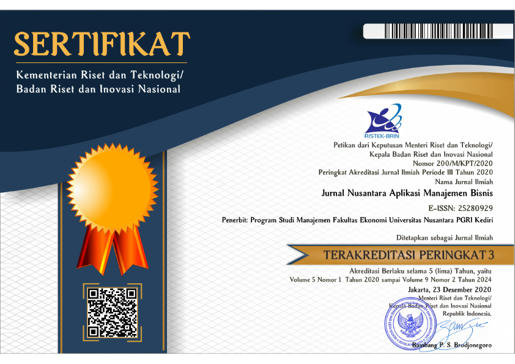IS THERE ANY IMPACT OF SOCIAL MEDIA ON ACADEMIC PERFORMANCE? (An Empirical Study From College Student In Jakarta)
DOI:
https://doi.org/10.29407/nusamba.v2i2.849Keywords:
social network, Facebook, Twitter, Academic Performance, GPAAbstract
This study aimed to examine empirically the social network activities that affect academic performance. Obtain sample data using questionnaires and obtain data from top 10 universities in Webometrics and total 75 respondents. This study examined the utilization period of social networks, social network usage motivation, academic data and activities respondents perceived influence on academic performance. Using multiple regression techniques, the study found that social network activity does not negatively impact on academic performance.
Keywords: social network, Facebook, Twitter, Academic Performance, GPA
Downloads
References
Aritonang, Keke T. (2007). Minat dan Motivasi dalam Meningkatkan Hasil Belajar Siswa. Working Paper.
Bosch, T. E. (2009). Using online social networking for teaching and learning: Facebook use at the university of cape town. Communication: South African Journal for Communication Theory and Research, 35(2), 185–200.
Boyd, D. M., & Ellison, N. B. (2007). Social network sites: Definition, history and scholarship. Journal of Computer-Mediated Communication, 13, 210–230.
Dalyono, M. (1997). Psikologi Pendidikan. Jakarta: Rineka Cipta.
Ellison, N. B., Steinfield, C., & Lampe, C. (2007). The benefits of facebook ‘‘Friends:’’ Social capital and college students’ use of online social network sites. Journal of Computer-Mediated Communication, 12(4), 1143–1168.
Espinosa, L. M., Laffey, J. M., Whittaker, T., & Sheng, Y. (2006). Technology in the home and the achievement of young children: Findings from the Early Childhood Longitudinal Study. Early Education and Development, 17, 421–441.
Eyadat, W. dan Eyadat Y. (2010). Instructional technology and creativity among university students: the missing link. World Journal on Educational Technology, 2(2), 87-99.
Hunley, S. A., Evans, J. H., Delgado-Hachey, M., Krise, J., Rich, T., & Schell, C. (2005). Adolescent computer use and academic achievement. Adolescence, 40, 307–318.
Irnawati, Poppi. (2003). Analisis Model Faktor-Faktor yang Mempengaruhi Indeks Prestasi Kumulatif Mahasiswa Program S1 Ekstensi Matematika Institut Teknologi Sepuluh November Surabaya. Tugas Akhir Perkuliahan.
Joinson, A. N. (2008). ‘Looking at’, ‘Looking up’ or ‘Keeping up with’ people? Motives and uses of facebook. In Proceedings of the 26th annual SIGCHI conference on human factors in computing systems (pp. 1027–1036). New York: ACM.
Karpinski, A. C. & Duberstein, A. (April 16, 2009). A description of Facebook use and academic performance among undergraduate and graduate students. In Poster presented at the meeting of the American Educational Research Association, San Diego, CA.
Kirschner, Paul A. dan Aryn C. Karpinski. Facebook® and Academic Performance. Computers in Human Behavior, 26 (2010), 1237-1245.
Kolek, E. A., & Saunders, D. (2008). Online disclosure: An empirical examination of undergraduate Facebook profiles. NASPA Journal, 45(1), 1–25.
Kubey, R. W., Lavin, M. J., & Barrows, J. R. (2001). Internet use and collegiate academic performance decrements: Early findings. Journal of Communication, 51, 366–382.
Lampe, C., Ellison, N., & Steinfield, C. (2006). A face(book) in the crowd: Social searching vs. social browsing. In Proceedings of the 2006 20th anniversary conference on computer supported cooperative work (pp. 167–170). New York: ACM.
Lampe, C., Ellison, N., & Steinfield, C. (2008). Changes in use and perception of facebook. In Proceedings of the ACM 2008 conference on computer supported cooperative work (pp. 721–730). New York: ACM.
Lei, J., & Zhao, Y. (2005). Technology uses and student achievement: A longitudinal study. Computers & Education, 49, 284–296.
Lewis, J., & West, A. (2009). ‘Friending’: London-based undergraduates’ experience of facebook. New Media & Society, 11(7), 1209–1229.
Murray, K. E., & Weller, R. (2007). Social networking goes abroad. International Educator, 16 (3), 56-59.
Pasek, J., More, E., & Hargittai, E. (May, 2009). Facebook and academic performance: Reconciling a media sensation with data. First Monday, 14(5). Available at http:// www.uic.edu/htbin/cgiwrap/bin/ojs/index.php/fm/article/view/2498/2181.
Pempek, T. A., Yermolayeva, Y. A., & Calvert, S. (2009). College students’ social networking experiences on facebook. Journal of Applied Developmental Psychology, 30(3), 227–238.
Purwanto, Ngalim. (2004). Psikologi Pendidikan. Jakarta: PT. Remaja Rosdakarya.
Ross, C., Orr, E. S., Sisic, M., Arseneault, J. M., Simmering, M. G., & Orr, R. R. (2009). Personality and motivations associated with Facebook use. Computers in Human Behavior, 25, 578-586.
Sheldon, P. (2008a). Student favorite: Facebook and motives for its use. Southwestern Mass Communication Journal, 23(2), 39–53.
Soemanto, Wasty. (1990). Psikologi Pendidikan. Jakarta: Penerbit Rineka Cipta.
Stern, L. A., & Taylor, K. (2007). Social networking on facebook. Journal of the Communication, Speech & Theatre Association of North Dakota, 20, 9–20.
Urista, M. A., Dong, Q., & Day, K. D. (2009). Explaining why young adults use MySpace and Facebook through uses and gratifications theory. Human Communication, 12(2), 215–229.
Vanden Boogart, M. R. (2006). Uncovering the social impacts of Facebook on a college campus. Master Thesis. Kansas State University.
Wellman, B., & Gulia, M. (1999). The network basis of social support: A network is more than the sum of its ties, in Wellman, B. (ed): ‘Networks in the Global Village’, Boulder, CO, Westview press.
Young, A. L., & Quan-Haase, A. (2009). Information revelation and internet privacy concerns on social network sites: A case study of facebook. In Proceedings of the fourth international conference on communities and technologies (pp. 265–274). New York: ACM.
Zhao, S., Grasmuck, S., & Martin, J. (2008). Identity construction on facebook: Digital empowerment in anchored relationships. Computers in Human Behavior, 24(5), 1816-1836
Downloads
Published
Issue
Section
License
Authors who publish with this journal agree to the following terms:
- Copyright on any article is retained by the author(s).
- The author grants the journal, the right of first publication with the work simultaneously licensed under a Creative Commons Attribution License that allows others to share the work with an acknowledgment of the work’s authorship and initial publication in this journal.
- Authors are able to enter into separate, additional contractual arrangements for the non-exclusive distribution of the journal’s published version of the work (e.g., post it to an institutional repository or publish it in a book), with an acknowledgment of its initial publication in this journal.
- Authors are permitted and encouraged to post their work online (e.g., in institutional repositories or on their website) prior to and during the submission process, as it can lead to productive exchanges, as well as earlier and greater citation of published work.
- The article and any associated published material is distributed under the Creative Commons Attribution-ShareAlike 4.0 International License












